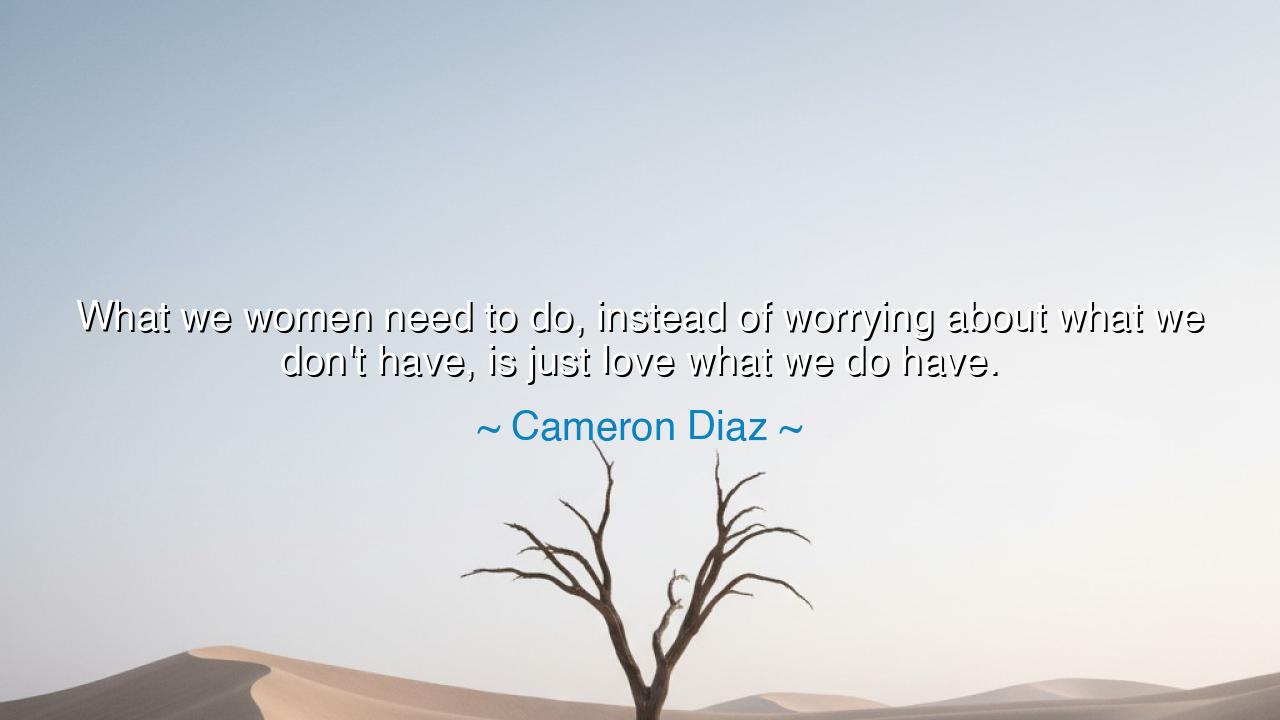
What we women need to do, instead of worrying about what we
What we women need to do, instead of worrying about what we don't have, is just love what we do have.






Cameron Diaz, with the voice of one who has seen the snares of comparison and the burden of desire, declared: “What we women need to do, instead of worrying about what we don’t have, is just love what we do have.” In these words, there is a call to liberation, not from chains of iron, but from the subtler chains of envy and discontent. She urges women—and by extension, all humanity—to turn their gaze from absence to presence, from longing to gratitude.
The essence of her wisdom is that joy is found not in the endless pursuit of what is lacking, but in the embrace of what is already given. To love what we do have is to recognize the sacredness of the body, the spirit, and the blessings of each day. It is to silence the voices of a world that thrives on making us feel incomplete, and instead to root ourselves in wholeness. This lesson is as old as the Stoics, who taught that contentment is not found in possessions, but in perspective.
History reflects this truth in the life of Epictetus, the slave-turned-philosopher. Bound in servitude and deprived of status, he nevertheless declared that freedom lies in how one views one’s circumstances. Though he lacked wealth, he possessed wisdom; though he lacked liberty, he cultivated peace. His life embodies the same teaching Diaz voices: that true power lies in learning to cherish the gifts already within one’s grasp, rather than despairing over what is withheld.
Diaz’s words also carry defiance against a culture that often tells women they are never enough—never beautiful enough, never young enough, never successful enough. By urging them to love what they have, she turns this lie on its head. She speaks as a herald of self-acceptance, reminding women that the world’s scales of value are false, and that dignity is not measured in comparisons but in love for oneself.
Let this wisdom endure: contentment is the seed of freedom. To love what we do have is not to surrender ambition, but to stand firmly upon gratitude before we reach higher. For those who walk in envy will never rest, but those who walk in thankfulness carry a joy unshaken by loss. As Cameron Diaz teaches, the path to wholeness begins not in longing for what is absent, but in loving what is already ours.






ANAnh Nguyen
This quote by Cameron Diaz speaks to a universal truth about embracing gratitude and self-love. But can we truly love what we have when society and the media continually tell women they need more to be worthy or beautiful? Is it realistic to ask women to focus on self-love in a world that often seems to prioritize perfection over authenticity? How do we find the balance between self-love and the desire to evolve?
TTLo Thi Tinh
Cameron Diaz’s quote is about self-acceptance, which is an important message. But can it be more complicated than just ‘loving what we have’? In a world where women are often told to do more, look different, or be better, how do we combat that constant external messaging? Shouldn’t we focus not just on self-love but also on creating spaces where women are valued for who they are, not just for what they have?
TVPham Thi Vi
Loving what we have, as Cameron Diaz suggests, is an important mindset, but is it enough in today’s world where so many women face external pressures and internal insecurities? How do we balance this self-love with the desire for growth or change? Shouldn’t we aim for a world where women can love themselves AND strive for more, without feeling like one negates the other?
HPNguyen Binh Ha Phuong
Cameron Diaz’s quote is uplifting, but is it realistic for all women, especially those dealing with societal pressures or personal struggles? How do we truly learn to love what we have when we feel constantly told that we’re not enough? Is this advice more applicable to women who already feel empowered, or can it also speak to those who are still navigating challenges in their lives, both internal and external?
NHNgoc Ho
I agree with Cameron Diaz’s sentiment, but I wonder if it oversimplifies the challenges women face in a world that constantly pushes us to strive for more—whether that’s in appearance, career, or lifestyle. Can self-love alone counteract the systemic pressures that women face? Is it possible that simply loving what we have is part of the solution, or does it require deeper structural changes to really empower women?